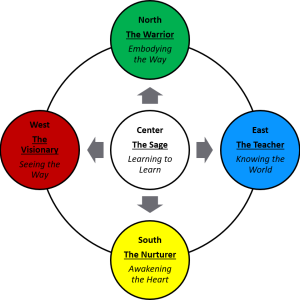Leadership Wheel
The Leadership Wheel, developed by Clint Sidle (from Cornell University), is one of our favorite modules to work with!
Through an interactive assessment, participants will learn about the four leadership styles that make up the Leadership Wheel. We'll develop self-awareness in regard to one's "home" area and discuss how to develop new skills to balance and grow personally and within their team. Our facilitators typically lead participants through exercises and activities that encourage them to reflect on their innate skills and how their behaviors affect others. What we love about this model is the focus on "turning the wheel" in order to adapt to different group settings. Once participants have found the area of the wheel where they are most comfortable, we ask them to connect with like-minded people and then individuals who represent an opposite way of engaging with the world. From there, a team can consider how to utilize different skills to strengthen the team.
This module can be custom fit to your goals. Your group will do a self-assessment during the program. We'll debrief the results of the assessment together and from there, we encourage your group to take part in a 1-2 hour portable program where we'll see the Leadership Styles in action!
Introduction by Clint Sidle
"The shape of the circle has been an important symbol of unity and wholeness for cultures throughout the world from almost the beginning of time. The mandala, or medicine wheel, the most sacred form of the unifying circle, has long been a universal image of the cosmos and the nature of existence.
"The wheel generally consists of five primary energies or aspects of existence placed in the four cardinal directions of the compass with one in the center. Carl Jung studied versions of the wheel in Asian, African and Native American cultures. He considered it a human archetype, a pattern occurring across cultures and representing the cosmos as well as the self.
"The ancient belief is that an individual is born with a preference for a single archetype and so enters the world imperfect, with little wisdom or understanding of the others. However, since the purpose of life is to venture beyond habitual preferences, to learn and grow toward wholeness, the heroic person is to make an effort to access the unique and complementary wisdom in each of the four directions."
Sidle, Clint. The Leadership Wheel: Five Steps for Achieving Individual and Organizational Greatness. St. Martin’s Press, 2005.

